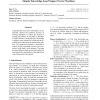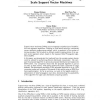2031 search results - page 38 / 407 » Oblique Support Vector Machines |
ICML
2006
IEEE
14 years 9 months ago
2006
IEEE
If appropriately used, prior knowledge can significantly improve the predictive accuracy of learning algorithms or reduce the amount of training data needed. In this paper we intr...
ICML
2004
IEEE
14 years 9 months ago
2004
IEEE
We introduce a framework, which we call Divide-by-2 (DB2), for extending support vector machines (SVM) to multi-class problems. DB2 offers an alternative to the standard one-again...
ICML
2000
IEEE
14 years 9 months ago
2000
IEEE
We describe a simple active learning heuristic which greatly enhances the generalization behavior of support vector machines (SVMs) on several practical document classification ta...
ECML
2003
Springer
14 years 1 months ago
2003
Springer
Abstract. Classical learning algorithms from the fields of artificial neural networks and machine learning, typically, do not take any costs into account or allow only costs depe...
CORR
2008
Springer
13 years 8 months ago
2008
Springer
Support vector machines (SVMs) are an extremely successful type of classification and regression algorithms. Building an SVM entails solving a constrained convex quadratic program...


